Text
unlearning love
our dreams (cos how to love someone and be loved is always a dream - an ideal - even when you actually, and factually, love the person and they love you back) will inevitably clash with who we are, our personality and ways of being, and what the beloved is, warts and all. relationships that last, not work, are about unlearning love. otherwise, like love - with its jealousies and need to possess - they end in disaster.
even Job learns this lesson. for Job's relationship with God to work, he unlearns love. for, how could God let him go through that much if he loved him? how could he? how could Job continue to love God despite everything God intentionally put him through? how could he?
what could we learn love as then?
*** this reflection was inspired by a conversation I had with a friend in the past week about why my parents divorced, and whether the same fate awaits his parents.
1 note
·
View note
Text
Race – a rough sketch
This is not a response to, as it is inspired by, your contribution – timely and partial – on and about the [physical, psychological, economical, societal, etc.] violence “black” people experience, a result of race. I’ve been meaning to put some of my thoughts on race, cluttered as they are, on paper, so your piece provided the motivation. Your article reads like an affirmation of black people, and this praise is to be welcomed, because they continue to face pressures, a burden of race. In anyway, indeed, “black” is AMAZING. But you place this AWESOMENESS along the white/black binary, which I take exception to, because “black” is PHENOMENAL in and of itself, not in relation to.
Some initial remarks.
One:
Nations (loosely describable as a grouping of people which considers itself as a unit) always developed sentiments of ‘us’ amidst ‘them.’ Traditionally, these sentiments are built around notions of language, culture, religion, common heritage, etc. Lately, anything that would hold really - in South Africa in 1996 the notion was the ‘rainbow nation.’ These concepts are tapped into when invoking a sense of patriotism.
Two:
The human mind has a habit of ‘rationalising’ that which is new and different using that which it already knows and is familiar with. Hence ‘them,’ the others - being different from us - may be subject to a joke or two, even stereotyped, maybe regarded as weird, and perhaps also invaded, as is human.
Three:
Power – in all its manifestations, but especially as it relates to (re)representation, being the most potent political tool, as Biko once observed – has always been [both internally and externally] contested. So centres of power, across time and/or space, come and go, and with them, the status quo.
Four:
The details of history are but one of the ways of (re)representing, so they are rarely neutral, and therefore, are always up for contestation.
Let’s get the history lesson out of the way.
It all starts around the 16th/17th/18th century, race that is. The groundwork for European ‘modernity’ is being laid, the industrial revolution is gaining momentum, the scientific impulse is in full swing and colonialism is taking shape. Europe is feeling very good about itself. This is the period of invasion and the Atlantic slave trade. It is in this broader context that ‘white’ people study ‘black’ people.
Afterwards, and this is the conceptualisation in the European mind; skin colour difference, which is the only main thing to it really, is racial, racism logical.
And so, “black” people are othered. Images are drawn, books are written. The message is clear: they are inferior, we are superior. Through this continued and sustained process of othering, race gains traction. To make it complete, even in the future, the 16th/17th/18th century serves as a prism through which non-‘whites’ are looked at. The period before the 16th/17th/18th century is also rewritten in terms of the 16th/17th/18th century.
The colonial quest, through a myriad of actions, both disturbs and influences the trajectory of Africa, and in our specific case, South Africa – a legacy of race. If the end of history was in 1989, for most people, white black, because race has been internalised, for the popular imagination, and because it is the popular narrative, history begins in the 16th/17th/18th century, and with ‘white’ people at the forefront (what Chimamanda Adichie would likely characterise as the stereotype that became the single story that became THE STORY).
In order for ‘white’ people to be, ‘black’ people become. That is why blackness – not BEING a black PERSON, because this can be many things - is a creation of whiteness. The condition of being a nigger, a kaffir, of being insignificant, inferior and dangerous just because you are ‘black’ - doesn’t exist outside these specific set of confines, outside whiteness.
On the other hand; blackness, in the present, has proven to be very real, in one sense. But, rather, race is the persistent thing, because of the many things that sustain it. The legacy of race, especially its material conditions still with us, and the internalisation of inferiority and superiority complexes, amongst other things, continue to sustain the enduring myth of ‘white’ people, and an even greater lie; a homogenous Europeans as a homogenous ‘white’ people, if whiteness is taken to mean progress and ‘white’ people the custodians of civilisation, of modernity.
To finish off.
The African mind also has its own conceptualisations, including knowing how the European mind has conceptualised things, because ‘black’ people also study ‘white’ people and “black” and “white” people in relation to each other (think here individuals like Frantz Fanon, Kwame Nkrumah, and closer to home, Steve Biko). So that enduring picture of a superior white people isn’t complete, could never be complete.
History doesn’t and didn’t end in 1989. It certainly didn’t/doesn’t begin in the 16th/17th/18th century; it actually precedes that period by a huge margin. Think here, the ancient African Egyptians, Of Carthage and Hannibal, Of Great Zimbabwe and Mapungubwe. And this list is incomplete; there was also Persia, and many others: the ages old Chinese empire in the East, etc.
As I’m implying, no nation is forever, because power is always contested, and conceptualisations come and go; as was yesterday, as is today. Even though these conceptions are so pervasive during their time, they are never static or permanent. So, that arbitrary moment frozen in time that was supposed to be the image of ‘them’ for eternity: there’s no stopping the decolonial train.
So yes, ‘black’ people do not exist but in the minds of those who want to be ‘white’ people. Yet this thingification, born out of a myth as it is, is also very real, in one sense – work that needs to be done.
My own thoughts on race are cluttered, certainly disorganised. My formal education, unsurprisingly, sustains the myth of ‘white’ people. So this piece, that isn’t really a response, is also an attempt at cleaning up.
#race#racism#atlantic slave trade#south africa#biko#othering#decolonisation#decolonial#black and white#blackness#whiteness#europe#black consciousness#race theory
1 note
·
View note
Text
a love letter for joburg - the city of gold
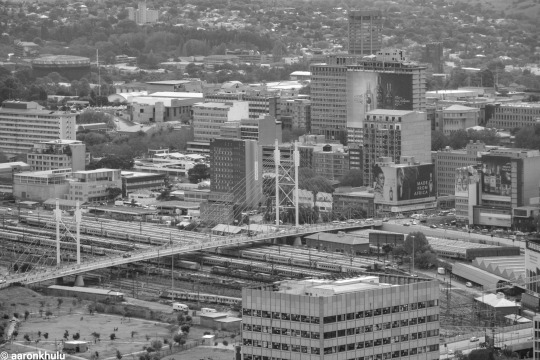
In my search for what Afrikan urbanity (if there is ever such a thing) would look like, there’s always been something about Johannesburg. Most Afrikan cities are colonial, in post-colonial, some trying to find and assert themselves, others just content. Certainly though, Joburg is complex; a city of contrasts mired in contested histories.
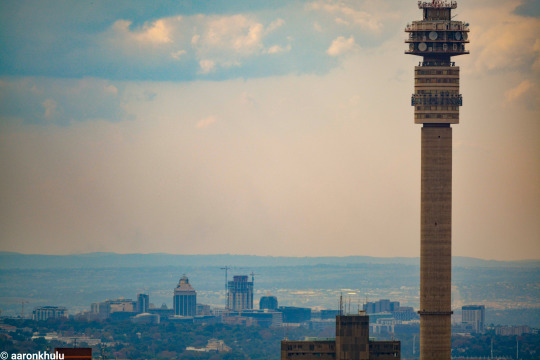
To be sure, there must/may have been something here before the city stood tall. I do not know much of it. Certainly though, the discovery of gold left its indelible mark.
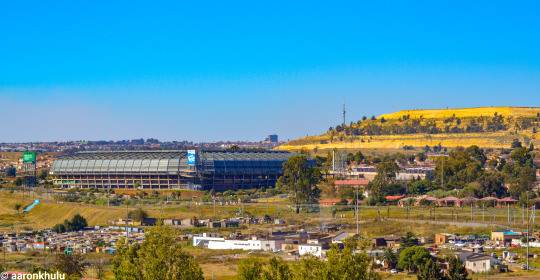
For some reason, big city-ness evaded Kimberly post the diamond rush, even though diamonds are still being recovered. But it caught on, and stayed, in Joburg post the gold rush, even though little gold is left. The current metropolis is a bustling city; tallest building in Africa, largest dry port in the world, biggest hospital in the southern hemisphere. To be worldly has always been appealing.
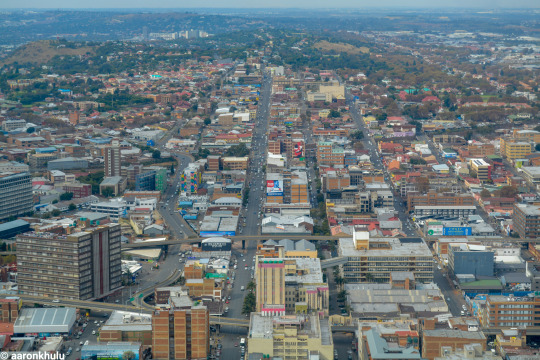
But the city is contested. It belongs to no one and to everyone. It was born of hustlers, speculators, chancers and immigrant cheap labour. Of ex-convicts from Europe and banished Jews. Of recent economic empowerment-ees and fronting white people. Steeped in a history of forced removals and forced settlements: so really, who can exclusively claim it as his own?
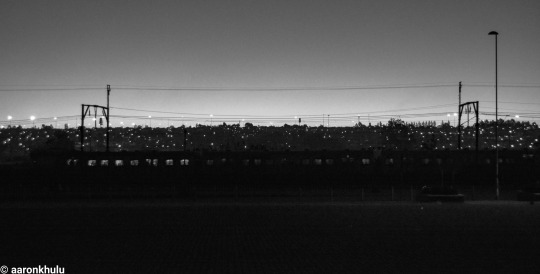
I read that on the eve of democracy (that aspect of political systems that never fully translates into freedom for all), the white middle class packed-up for the northern suburbs. It wasn’t long after, I’m told, that Hillbrow ceased to represent the best of city living. No one dared ask, the “best of city living” from whose perspective?
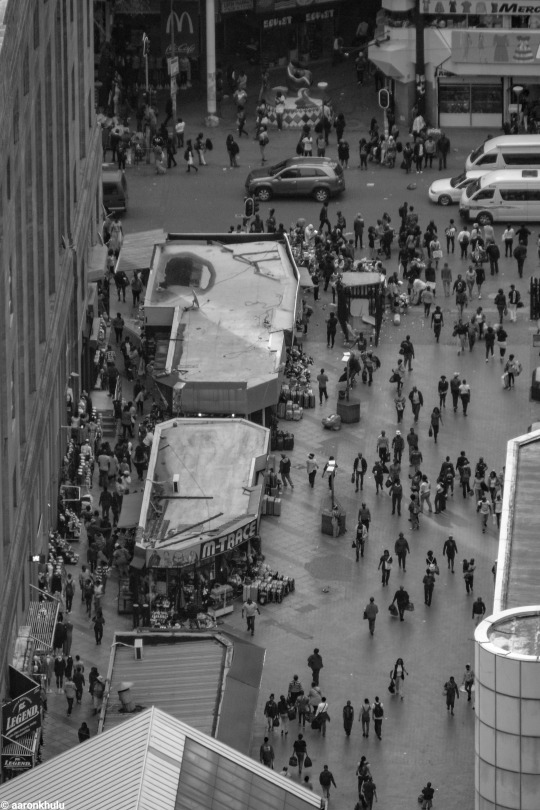
Sure, central Joburg is a dirty, busy, crowded place. But it is this Joburg that holds the most potential for poor daring Afrikans. Early stage capitalism and hustling cross paths here. Growing up, in the early 2000s, in one of Joburg’s peripheral townships, cosmopolitanism was defined with reference to your ability to navigate that part of Joburg with ease. It represented an urbanity that could not be experienced in the townships because of the social engineering experiment that was apartheid.
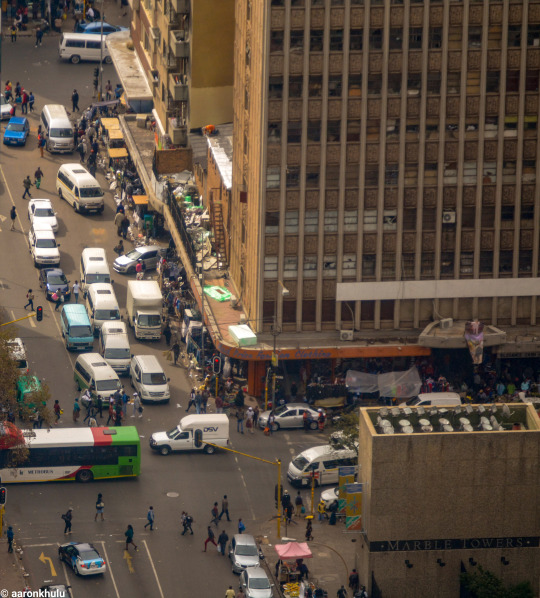
Lately, packets of safe (together with the security apparatus that comes with it), of hip, trendy and cool are being created in the CBD (i.e. Maboneng). Yep, the Joburg CBD is undergoing gentrification. And with that has come displacement. The displacement may not be forced, but it is implicit: such spaces are middle class by design.
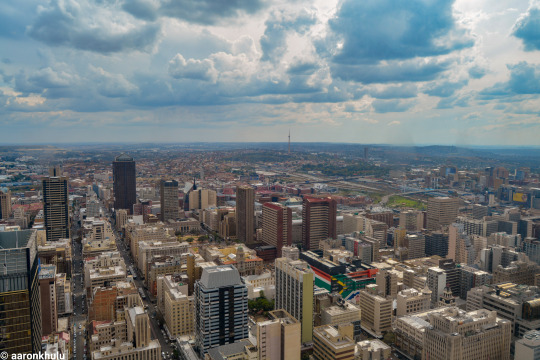
But, maybe it is in the nature of cities to continually re-invent themselves. Joburg is no different. Having run out of its own gold to exploit, it is constantly looking northwards, to the rest of Afrika, to satisfy its cravings for profits (MTN and Shoprite, anyone?). Which should remind us, empire was not necessarily European and imperialism comes in many forms.
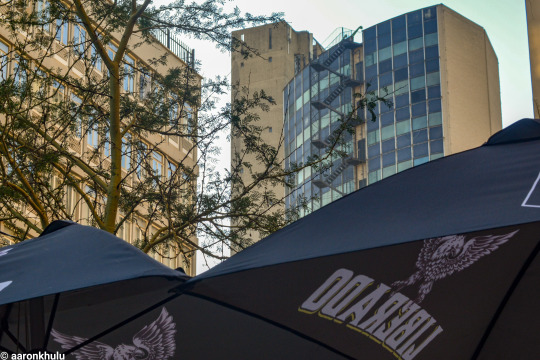
****
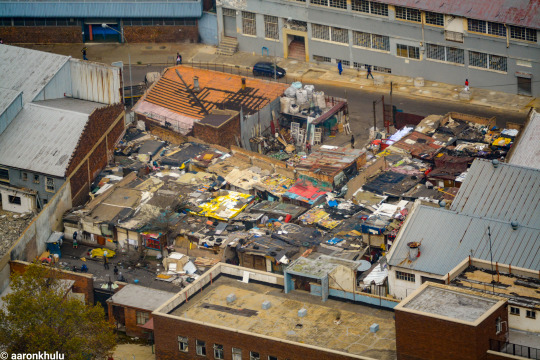
Southern Africa has always interacted in Gauteng. Although Joburg’s roads are not “some national road in Malawi,” they were built on the back of cheap, exploited immigrant labour from all over Southern Afrika. We watch in shock as those who made this city what it is, are burned alive because they are not black South African.
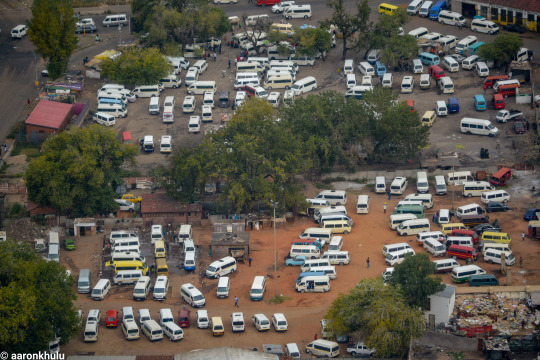
But they forget. The new South Afrika shouldn’t have been termed the “rainbow nation” because of the other failed attempt at social engineering that was reconciliation, but because it had Johannesburg.

****

You cannot write Joburg without mentioning it’s hard, in your face capitalism. The message it espouses is clear; consume. Its elites are entrenched in the BMW. Its youth are flamboyant (think Izikothane and lately, slay kinging and queening). Its highways are lined with billboards. Its informal sector can sell you anything and everything at any given major road intersection.
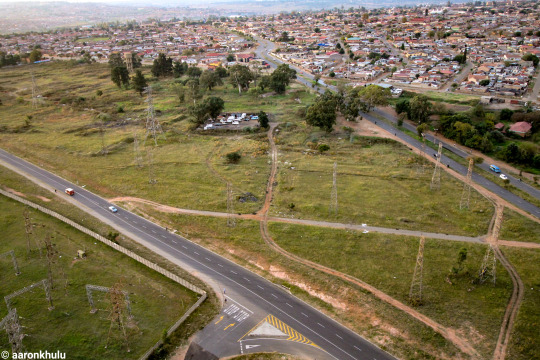
Cape Town is too quasi-European; it has yet to shake its racist image. Pretoria is stately; its allure lies in how orderly it can seem to be. Port Elizabeth can sometime appear to be culturally homogenous. Durban, well Durban I’m yet to understand. But Johannesburg, Joburg is alienating because it is exploitive, its currency is money.
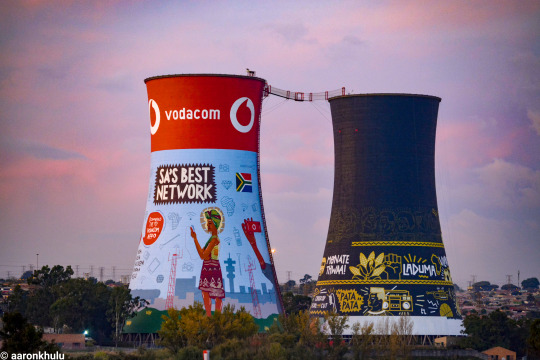
Do not be misled though. Poverty is rife in this concrete jungle. Inequality stares affluence in the eye from right across the road (think Alexandra and Sandton /Thembisa and Kempton Park / Fourways and Diepsloot).
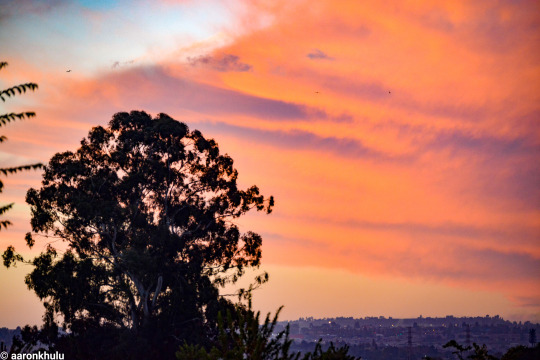
In the end Joburg is what it is. But we mystify it. We exaggerate it. Truly though, we just want it to continue having a lingering presence in the making of a post-apartheid South Afrika, of a post-colonial Afrika. It sells itself as a “world class Afrikan city after all.”
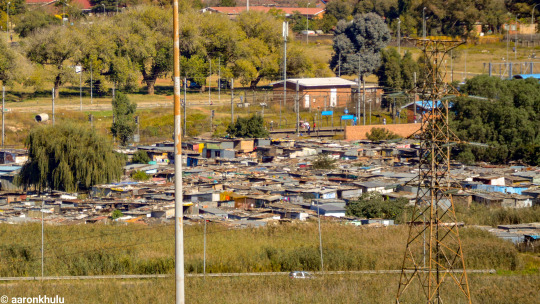
6 notes
·
View notes
Text
soshanguve funeral twerking
a one year old you-tube video has gone viral. ok, i don’t know its age. but i first saw it last year. now that its infamous, it has caused moral panic and outrage. and possibly, a twitter hashtag – as do most things that go viral. as if to blur lines between reality and representation, the story of the video was even picked up by city press.
the you-tube clip shows several girls, almost all wearing mini-skirts, dancing at a funeral – by the grave side. they perform a dance move known as twerking. perhaps due to the nature of a twerk, the girls’ skirts keep rising. at some points, several of the girls intentionally lift their mini-skirts to show their underwear. one of them even raises her leg to flash. what is depicted in the video seems to have happened at an actual burial (i.e. it is not acted up).
youtube
after learning of the video last year, i sent its link to a couple of friends. one, from the eastern cape, dismissed it as how gauteng people lived. another complained of the apparent lack of respect around/for a sacred event. yet another, a female, wondered about the men in that family and their obvious inability to stop the girls. in the end, they all speculated about the life the deceased and her friends must have lived.
let me add my voice to the discussion without moralising.
what is depicted in the video is the manifestation of a certain way of being and living for a certain population segment. broadly, it is how young (aged between 18 to 38), black (those from historically oppressed backgrounds), non-first generation peri-urban dwellers (i.e. those born, bred and live in the townships) collectively group identify and give expression to said group identity. underlining all this is a hype around good times. think how expensive whiskey’s have taken kasi by storm, the phenomenon of the sunday chill at shesa nyamas, monday malamohodu sessions and funeral after-tears.
it is emergent group identity made visible. which can be regarded as cultural innovations; practices (like what the video depicts) through which group identity is given expression to. cultural because such practices have ways of becoming entrenched, ceremonial, repetitive and/or representative. innovative because such practices are new, popular and/or against the sensibilities of the prevailing order (or at least, its public sentiments).
with apartheid and the ways in which it ‘designed’ everyday black life – whether in conformity as working class (wake up, go to work, get called a kaffir, come back late, go to sleep) or resistance (underground meetings, exile, marches, etc.) or in conformity in the limited ways one could work at class mobility (i.e. belonging to the black managerial, professional or entrepreneurial classes - the school inspectors, the shop owners, etc.) – dismantled, a vacuum opened for new ways of “living.”
and township cultural innovation is filling the gaps. tribal identities of old are slowly giving way to ‘kasi’ ways of belonging. think mamilano, mapotjha and izikhothane, among others.
vimeo
but in what ways?
the rise of the charismatic evangelical churches and their excesses (e.g. the pastor who made his congregation eat grass) has also fragmented the moralising power of religion in non-believer communities. conspicuous consumption by the new elites (e.g. kenny kunene eating sushi off a naked model) is driving the commodification of everyday life in the townships. in this context, dancing at a funeral becomes a natural extension of these new developing cultures.
this is the alternative way of looking at and interpreting the video. beyond the outrage; it is the coming together of divergent developments.
#shoshanguve#twerking#funeral twerking#youth culture#south african youth culture#izikothane#kasi#soweto
0 notes
Text
a collection of random thoughts on race
£££
a few years back, at university, i came to the realisation that I was black... and this realisation led to social withdrawal and an inferiority complex... one response and initially my reaction, wholly reasonable given the injustices, was anger... but the danger with anger, just like hate, is that it consumes and numbs you... i found refuge, and thus the will to freedom, in black consciousness literature - with it's emphasis on black people's rediscovery of their worth as humans...
£££
black/white as relative markers of difference (in the same way as tall/short or zulu/german) isn't at all problematic... the problematic is the social history and conditioning that follows the black/white dichotomy..
£££
race was made through framing the black, after defining it as the african, as the problem. should we not then attempt to undo race by framing whiteness as the pathology?
£££
when we talk about such things as white privilege, institutional racism, etc. we are trying to highlight the many ways in which the making of black people as inferior and white people as superior (the original racism) has permuted and permeates other spheres of living. this includes bringing to the fore who benefits and how they benefit from the original sin.
£££
i have a difficult relationship with violence, and the forms it should take, as an antidote to racism and colonialism because i fully appreciate, and have experienced, how burdensone - psychologically, socially and economically - carrying the stigma and consequences of racism can be.
£££
there's no such thing as black on black hate. there's racism (and no, blacks can't be racist towards other blacks or whites) and how it taught, and continues to influence how, black people relate to one another and themselves as blacks.
£££
#racism#whiteness#blackness#institutional racism#white privelage#black consciousness#race#black and white#melanin
0 notes
Photo
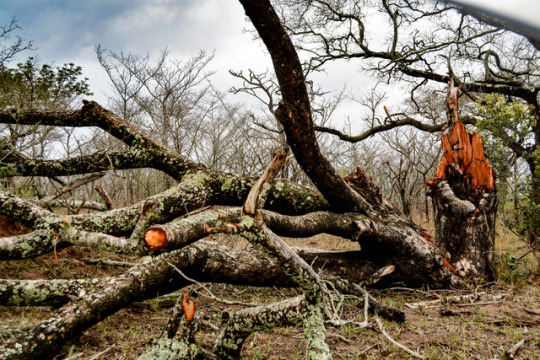
On a random drive one day, I come across this tree. I stop, and the is an impulse to take a photo.
There’s something that captivated me about the sight. I wondered how majestic the tree must have been before it fell, even as glorious as it looks cut off from its trunk; the centre that couldn’t hold. I wondered what will become of the sight, as nature and time run their course on the ruins.
People are sometimes alarmed by the state of some of South Africa’s inner cities (think Hillbrow), especially given their historical prestige (think Eloff street). The image becomes a metaphor for the processes that may be at play; the transformation of our cities into truly post-apartheid, post-colonial cities. It was Maya Angelou who once said, still I rise.
I’ll visit the spot again in the future. Oh yes, the future. Perhaps that’s what was alluring about the sight: the future, despite, or even against, the today. Hope!
0 notes
Quote
I've just watched the third episode of game of thrones, and I was reminded of how sexist one of my favourite tv shows really is: full of many ordinary men and the only women featured are of exceptional ability and talent, in their own different ways. This reminded me of some sports codes in South Africa; full of unmemorable white sportspeople and the only blacks allowed in are the remarkable ones. Conclusion: racism and sexism are different sides of the same coin: dominant group gate keeping in the name of standards, which a many of them don't display.
I
0 notes
Text
It ain't 'bout the hair, dah!
It’s always been about respectability. And in South Africa, as in most of the third world, notions of respectability have been contaminated by race.
Thus, when some black people speak about being respectable they expressing an unconscious desire to want to seem presentable before white people. Similarly, because race is a pathology both ways, when some white people police black people’s looks and behaviour, it’s just a rehash of colonialism other impulse: civilising black people - the false “I’m superior and you are inferior and therefore what I say is not only correct but can make you a better person” racial dynamic.
Although colonialism’s primary motive was always profits, it first had to conquer, and with each battle won, it felt good and overly confident about itself. This confidence was to birth another impulse, colonialism’s civilising mission - the push to improve black people and the false “I’m superior and you are inferior and therefore what I say is not only correct but can make you a better person” racial dynamic.
With black people’s fighting spirit and will to resist at times receding, overwhelmed as they would be from the advances the enemy was making, and erroneously connecting these advances with the personality and ways of being of white people, mimicking whiteness became a status symbol and a dividing force between “better” blacks and all the other blacks (stupid and savage), hence some black people's unconscious desire to want to seem presentable before white people.
So, another white school principle telling black learners how to wear their hair, with a learnt expectation that they will abide?
No, this ain’t just ‘bout wearing hair a certain way, dah! It’s about race, how race has contaminated black values, and how white people engage with black values (notions of respectability being an example) and is connected to a multitude of other things - how English is spoken (you speak so well), how the world is experienced (you are well travelled), how you handle yourself (you so unlike them), how hair is worn (you look neat) and all the other baggage driving a wedge between “better” blacks and all the other blacks.
Part of freedom, for both whites and blacks, is breaking away from the stranglehold race has on identity and the minute details of everyday life. Some call this decolonisation. This is why it was pleasant to watch the Pretoria Girls High learners go on strike last year. The moment didn’t represent a struggle to wear 'my hair my way’. It was a direct challenge against how racial sensibilities have and continue to taint black life. We need to break away from the stranglehold of race on everyday life so as to open new possibilities for being.
4 notes
·
View notes
Text
A fictionalised (re)membering of my failure to say "I love you"
She needed my “I love you.” Perhaps for the first and last time before we are departed forever. But, as a black guy raised and embraced in non-affectionate ways, I found it difficult to say it.
See, I have never doubted that those you raised me deeply cared and loved me. But this was more an actions-insinuation than a feelings-expression.
I didn’t have the guts to tell her, “I love you,” even though as I actively refrained saying it, I thought it, I felt it and knew it was the most appropriate thing, at that moment, to say. Ish sounds vulnerable, and as a black guy raised in a traditional way, I find it difficult to express need and fear.
Everyday, I try to actively unlearn culture, norms and traditions and shun well meaning meaningless societal expectations. Like that day, I still sometime fail.
“I love you” can heal and bless. Let everyone you love know you love them, even if you think they don’t love you back. You’d be surprised at what these three little words and a smile can do.
4 notes
·
View notes
Text
love as responsibility
My grandparents are still together, some 60 odd years since they got married, but I don’t think my grandparents still love each other. But there was beauty in watching their relationship mature post- my grandpa’s retirement. They were drawn to and with each other like never before. But the bind wasn’t love no more, at least not of the variety that once made me shun other beings for only my girlfriend, and made her MY life. The bind was responsibility for each other. Love not as passion anymore, love as ethics!
Love will always start as desire for the other, but if it doesn’t quickly transcend that, to become a responsibility (some call it commitment) to the other, it will end in failure.
And the South African story of our post-apartheid times; Persisting Racism. Until and unless “white” people feel a responsibility to “black” people, they can never love them. Successful love culminates into responsibility, otherwise farce... “for God so loved the world that He gave the only begotten Son...”
"�sB3�
2 notes
·
View notes